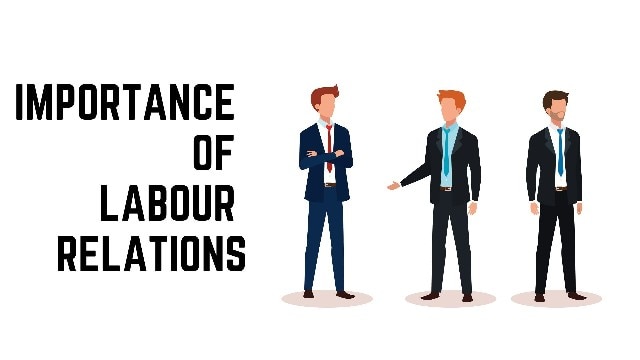Labour relations incorporate the processes involved in between Management & Union or Employers & Workforce for making effective decisions and channelising an organisation.
With the inclusion of right Labor Relations Strategies, an organisation can manage-
- Employers, Employees, Administrators, and Supervisors
- Matters related to the union organisations and employee representations
- Procedure Consultation together with Contract/Agreement/Policy and administration
- Grievance Administration, Collective Bargaining, Mediation, Investigation, and Arbitration
- Labour and Management Meetings and Relations
- Labour and Management informal conflict resolution
- Information requests of union
- Management and administrator training, etc.
So, all in all, labor relations play a crucial role in offering balanced advocacy between management and individual employees. In this post, we will dive deep into the importance of labour relations, what its purposes are and what kinds of issues Labour Relation resolves. So, let us get started-
Table of Contents
What is Labour Relations?
Human resource is the most crucial resource of a company, and it is a necessary resource that cannot be changed or removed from a company. A company can function without its manager sometimes, but it cannot run without its proper or sufficient human resources.
Labourers are like the stepping stone of a company, without the stepping stone, the company cannot establish itself; running in the market is an impossible thought to carry. They might be in the lower level of the company structure, but they are the highest priority of a company.
Labourers are directly responsible for the growth of a company.
They are to be taken with utmost care for the smooth and efficient functioning of the company. It is essential that for capable production, labourers are treated as a family because when they feel they are part of the company, they will work more wholeheartedly in providing excellent results.
Labour Relations ensure all this in the most smooth, efficient and result-driven manner.
The high-level personalities of an organization may find it challenging to keep a personal touch with every employee or labor working in their company. Therefore they appoint a human resource manager in every company who is responsible for managing all the human resources of a company.
The HRM looks into the matter of salary distribution. Managing labor relations is one of the key functions of HRM.
They need to ensure that labourers are satisfied with the management and they are motivated. They should ensure that the hard-earned money of the labourers in the company is paid on time.
Anyone seeking any help regarding raise, or issues that need direct guidance can easily approach the HRM in the company. It is how a company manages its employees and Labourers.
Process of labor relations involve 5 key components, let us have a look upon those as well-
Components
- Unionisation of the Labourers
- Handling of Dispute or Conflict
- Channelization of Collective Bargaining
- Adept Settlement of the Contract
- Effective Contract Administration
Now, after being aware of the labor relations and its components, you should understand why it is necessary for the businesses-
Importance
Laborer being the most crucial resource of the company, a company must effectively manage them because if the worker is happy, the company will be growing and making more revenues.
The whole production function is dependent on the workers, and if they aren’t confident with the company the product will stop, the profits will come down, and as a result, the company will get stuck.
The satisfaction of the employees and labourers are a matter of great concern as the turnover of labourers and employers are directly dependent on satisfaction.
Turnover at a high and regular rate creates a negative image of a company in the market.
The investors will never want to invest in a company that has a high standard of employee turnovers. And an investor is like a powerhouse for the company’s survival.
That is the reason why big industrial companies or manufacturing units, where a high amount of laborers work together in the production process allows the employees to form individual Labour Unions among them so as to improve industrial relations.
It is the best possible step of a company in reducing turnover rates and effectively manages its human resources.
Labor relations play a significant role in the effective establishment and channelization of different units that can ensure employee engagement, employee satisfaction, and employee retention.
Let us have a look at the key terms and concepts associated with Labour Relations Management-
Role
1) Labour Union Management
In multinational or big industrial or manufacturing companies, it is not possible for the labourers to directly approach the higher-level authorities.
Therefore without the help of mutual understanding, they form a body of unions. It is known as the Labourers Union, and it has a leader just like any governing body in our political system. The leader should stand for the rights of the labourers in a company if they feel that anyone is hampering the rights of the workers in the company. The labour Union leaders are allowed to speak directly to the managers and convey the messages of the labour on their behalf.
It helps in creating a smooth pattern of management in the company. If the Labour Union is not appropriately managed, the labourers can go on strikes and protests. In this situation, the company can lose its power of authority on the labourers.
Therefore it is said to be the trickiest part of the company to manage its labourers and keep them satisfied. The workers do not form union groups. Even if the groups are formed, then the company and the workers should have mutual profitability.
2) Labor Relationship
Every company has a unique group of labourers/employees. Therefore it should be managed while keeping in mind their requirements, benefits, needs, etc.
These are a few everyday needs of the labourer and the various ways in which a company can strengthen its relationship with the Labours:
- The biggest priority in everyone’s life is security. Labourers working in the organisation are highly concerned about their security of a job, life, and health. The families are highly dependent on their livelihood. Therefore the company must provide higher job security, proper wage on time, various health insurance facilities to create satisfaction among the workers.
- The second most challenging situation that the labourers face in a company is who to report about an issue. Most of the time, the complaints of the labourers do not come under the notice of management as they get lost in the process. It is the primary reason for strikes and protests in the company. Therefore the company must make sure to create a body to work directly in solving the grievances of the workers as this will make them feel that their complaints are being heard.
- The third most important thing for an employee or worker is the increase in the pay of their wages. As time is changing the requirements of the people are also changing, and a considerable price change is easily seen today. It is getting complicated for poor people to manage in a particular amount. A company should keep making changes in the salary of labourers from time to time as per the movement of the market. It will decrease the rate of turnovers in a company and labourers will be highly satisfied.
- The business environment is dynamic and diverse, as it keeps changing now and then. The professional world is advancing at a higher pace. The aforementioned creates insecurity among the labourers of the company that have been working in the company for years. The company is responsible for upgrading the knowledge of the labourers in the company. The company should make the employees aware of the fact that the growth of the company is giving their individual growth as well.
These are a few ways in which a company can satisfy the people working in their company and maintain a healthy relationship with them.
3) Is Labour Union organization is a threat to the Company
A company is a sole governing body that has the right to make and take decisions according to their choice keeping in mind the market and strategies of the company. The company also relies on governmental policies for their options. In such a case, when the laborers demand to form unions among them, it becomes difficult for the companies to permit such formations.
Labour union organisation is known for working in favor of the laborers of the company. Therefore, a struggle is always evident between the union and the company. The association still wants the company to include them in the various decision-making processes, and the company does want this to happen.
The company fears to lose the labourers as they are part of the union organisation and the union can directly influence the labourers to stop working in the organisation and therefore with a heavy heart the company has to include them in the production decision. The sole reason is that the company cannot risk losing its employees or labourers in the company as they are responsible for the growth of the company and its market value.
The company in which the labour union organisation exists they cannot independently recruit or remove any labourer from the job without concerning The Union. As the union is earmarked with certain rights and therefore the management has to decide a mutual prospect.
4) Formation of the Labour Union through Labor Relations Management
There are two ways for forming a labour union it can be created using the power and support of various informal groups present inside the company or through governmental support from the labour union of the national level.
When the alliance is formed, taking the help of the government parties, the matter becomes critical as a massive protest or high legal formalities can approach the company and force the company to accept their demand.
In the process of in house formation, the company has the power to keep in table its demands and they both can come to a mutual agreement. The company holds the position to make changes and take decisions as per its own choice or in a mutual consent without the interference of the government parties.
It is how the Labour Union Organisation is formed in a company through Labor Relations Management, so no issues arise between the management and union. It is also responsible for resolving different topics if they arise.
Hence, it can be seen how efficient Labor Relations is directly responsible for a company’s active and adequate functioning.
Let us now have a look upon different purposes of Labor Relations Management-
Purpose
- Ensuring harmonious relations between workforce and management and using the law where needed
- Legal representation in the implementation of labour rules, Labor law and regulations
- Offering physical facility and ensuring industrial peace
- Providing effective communication system in the organisation
- Initiating the right organisational and environmental changes
- Reduction in industrial actions such as lockouts, strikes, protests, etc.
- Ensuring organization stability, effectiveness, and stability
Labor Relations Wrap Up!
So, that was all about labor relations and their importance in channelizing a successful organization. Inclusion of Labor Relation Strategies in an organization plays a crucial role in ensuring effective communication between workforce and management.
It also plays a significant part in increasing employee satisfaction, employee engagement, employee motive and overall performance of the organization.
How important do you consider labor relations in channelizing a successful business model? Update us with your point of view in the comments below.
Liked this post? Check out the complete series on Human resources



I want you to send this to my email for me to read it properly
Please send this to my email
Notes which show the differences between labour relations and industrial relations with examples